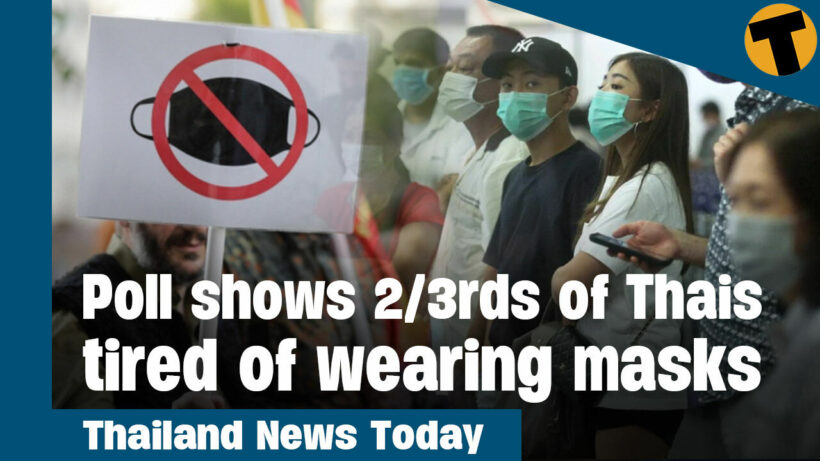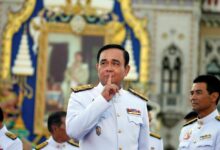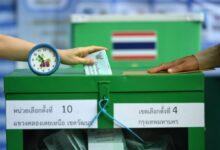Thailand News Today | Poll shows 2/3rds of Thais tired of wearing masks

A new poll shows that Thais are tired of wearing masks and prefer to skip the inconvenience in many instances.
The poll was conducted online by the Department of Health Service Support to judge people’s feelings about the relaxed Covid-19 restrictions in Thailand now.
7,500 people responded to the opinion poll that was conducted between June 17 and June 30, with nearly two-thirds of respondents saying that there were certain places that they prefer to no longer wear their masks. When asked about specific places Thai people do not want to mask up, entertainment venues were the top answer.
While wearing masks in public places and outdoor areas has not been required anymore since late June, many still choose to keep masks on, more so in light of increased infections after the long holiday weekend.
The poll focused on two main questions:
Do you still wear your face mask?
- 63% – prefer not to wear a mask in certain locations
- 36% – prefer to keep continue to wear a mask
- 1% – prefer to never wear a mask
What place do you NOT wear your mask anymore?
- 12.5% – entertainment venues. Lies.
- 10% – cinemas
- 10% – shopping centres
- 9% – markets
- 9% – public transport
———————
In the latest of the long list of things the Thai government is angry about, today the government hit back at a recent Gallup Global Emotions poll that placed the land of smiles as the least smiley country in ASEAN.
Singaporean media platform, Southeast Asia Stats, posted a “Southeast Asian Country That Treats People With a Smile” poll on its official Facebook page last Sunday, saying Thailand was the bottom country while Indonesia was the globe’s top nation. The poll revealed that Indonesian visitors experienced smiles 90% of the time.
Gallup Global Emotions 2022 surveyed more than 127,000 participants aged above 15 years old from 122 countries all over the world. Thailand placed behind all its ASEAN neighbours where 77% said they experienced smiles in Thailand.
Thailand’s low ranking surprised many people. Some agreed that the Thai people didn’t smile as much as they expected. Others said they were surprised that the kingdom lost its polling position. On the other hand, a number of Thai netizens commented they weren’t surprised adding that they couldn’t smile because of the country’s political and economic situation. Maybe also because everyone has their masks on.
The countries with the highest positive experiences were Panama, Indonesia, Paraguay, El Salvador, and Honduras. The countries with the lowest positive experiences were Afghanistan, Lebanon, Turkey, Egypt, and Nepal.
Thailand’s Deputy Spokesperson of the PM Office, Trisuree Trisaranakul, refused to accept the survey result, saying the objective of the survey should be to investigate negative and positive emotions, together with stress and worries, among the global population. According to the report, negative experiences of people worldwide have increased. People are worried about war, inflation, and the pandemic.
Trisuree added that Thailand is a top destination for tourists. Thai smiles and kindness are aspects drawing tourists to the country and the reason it is named the Land of Smiles.
——————–
I know you may admire some people who previously held this position and praise them for doing a better job than me. That’s fine. Just bring them back if you can.”
The first day of the no confidence debate saw some fiery exchanges between the PM and the opposition MPs goading him on his record and his time as premier. Prime Minister Prayut Chan-o-cha fended off accusations of corruption and economic mismanagement in a televised session of the parliament. This is the fourth censure motion brought against the PM and his government, this time targeting ten of his cabinet MPs as well.
Dr Cholnan Srikaew, the MP from Nan province and the new leader of the opposition Pheu Thai party challenged Prayut Chan-o-cha and his government’s record during the Covid pandemic in Thailand.
He accused the prime minister of mishandling the Thai economy, leading to rising costs, and his failure to improve the economy for ordinary Thais.
He also stated that the current government had extended its borrowing limits each year of its governing and said that large businesses had grown but most Thai people came poorer.
He went further to accuse the PM of using government money to “buy votes” in exchange for their support of the 17-party coalition (by investing in their provincial funding and projects).
He “then alleged that the PM failed to understand the separation of the executive and legislative branches of the government and therefore destroyed the fundamental principle of governance.
PM Prayut responded with accusations about Pheu Thai’s links with the former PMs, Thaksin Shinawatra and Yingluck Shinawatra. He challenged Pheu Thai to bring two former prime ministers, who are both in self-exile, “back to solve the country’s problems”.
Prayut hit back saying “I know you may admire some people who previously held this position and praise them for doing a better job than me. That’s fine. Just bring them back if you can.”
Twice, the military has taken over the government from Shinawatra-led elected governments – Thaksin in 2006, and his sister, Yingluck, in 2014.
PM Prayut went on to defend his government’s performance.
“My government has steered the country hit by one crisis after another toward economic recovery. Thailand has been praised for its efforts to deal with Covid over the past two years, serving as a model for other countries to follow.”
He then spoke of the many travellers and tourists that had headed back to Thailand.
“More than 2.2 million tourists have returned, with 1.25 trillion baht in revenue.”
He defended the government saying that they had “dug deep” into its budget “to ease the plight of people affected by economic hardship”.
It was also a day of attacks on the deputy PM and public health minister Anutin Charnvirakul who had to respond to accusations that he had botched the announcement of decriminalisation of the happy plant in Thailand, neglecting to change or clarify the current laws relating to the use and extent of the legalisation of of the plant, including recreational use.
—————
Amnesty International today accused the Myanmar military of committing war crimes by laying antipersonnel landmines in and around villages in the Karenni Kayah State.
The NGO revealed they have conducted an investigation in conflict-affected parts of the state and concluded the antipersonnel landmines are inherently indiscriminate and therefore contravene international law.
The landmines have been laid in and around villages in Kayah, a conflict-affected region near the border with Thailand, killing dozens of innocent people.
Amnesty International’s Crisis Response Deputy Director, Matt Wells, said the Myanmar military’s use of landmines is abhorrent and cruel.
“At a time when the world has overwhelmingly banned these inherently indiscriminate weapons, the military has placed them in people’s yards, homes, and even stairwells, as well as around a church.
He urged countries around the world to cut off the flow of weapons to Myanmar and support all efforts to ensure those responsible for war crimes face justice.
The Karenni Human Rights Group recorded that at least 20 civilians have been killed or seriously injured by landmines in Kayah State since June 2021.
Soldiers have placed landmines in people’s yards, at the entrance of homes, and outside toilets, and in at least one documented case, soldiers boobytrapped a house stairwell with a trip-wire improvised explosive device. They have also placed landmines on paths to rice fields.
Senior Crisis Adviser at Amnesty International, Rawya Rageh said the military’s depraved use of landmines in homes and villages will continue to have devastating effects on civilians in Kayah State for years to come.
Latest Thailand News
Follow The Thaiger on Google News:


























